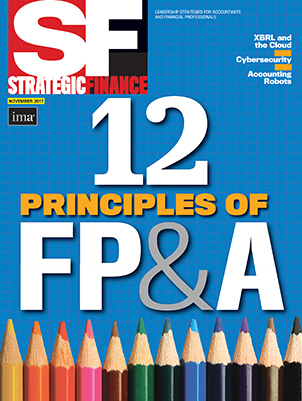On August 31, 2017, Wells Fargo (WFC), the banking and financial services giant, announced that the number of fraudulent checking or other accounts opened without customer approval or authorization was really 3.5 million, a two-thirds increase from the 2.1 million reported last year. (See “Lessons from the Wells Fargo Scandal” in the November 2016 issue of Strategic Finance.) The current analysis goes from January 2009 to September 2016. It also found 800,000 instances of unwanted auto insurance forced on customers and failure to make refunds to customers with auto loans.
Two burning questions remain: Were WFC’s disclosures of these problems to the investing public sufficient, and why didn’t WFC’s external auditors address this widespread fraud? WFC settled class-action lawsuits and claims from federal regulators in 2016. In testimony before the Senate Finance Committee in September 2016, soon-to-be replaced CEO John Stumpf accepted full responsibility for what occurred and was “deeply sorry” the bank failed to meet its responsibility to customers and didn’t act sooner to stem what he called “this unacceptable activity.” Blame for the fiasco was largely put on lower-level employees, with 5,300 being fired.
Later, the bank took a different tone. The Financial Review section of WFC’s Annual Report states, “Our current top priority is rebuilding trust through a comprehensive action plan that includes making things right for our customers and team members and building a better Company for the future.” The 2017 WFC Proxy Statement contains six pages describing “Retail Sales Practices—Our Path Forward” with subheads: Our Board’s Independent Investigation, Making Things Right for Our Customers, Our Culture and Ethics, and Our Risk Management Organization and Controls.
It took until an April 10, 2017, press release for information to reach the public that WFC had “strengthened ethics and risk management, including creating a new Office of Ethics, Oversight, and Integrity; adding protections so anyone can feel safe reporting his or her concerns to our Ethics Line; and expanding our training for our managers and bankers, so they can better respond.” In May 2017, the bank’s largest shareholder, Berkshire Hathaway’s billionaire owner, Warren Buffett, commented on the WFC scandal, “The main problem was [the bank] didn’t act when they learned about it” and “totally underestimated the impact of what they had done.”
It would appear that WFC senior financial managers may not have complied with several standards of the IMA Statement of Ethical Professional Practice. The failure to disclose the widespread nature of the fraud and its severe adverse consequences on WFC’s reputation and blame lower-level employees violated the first two Credibility standards, which require members to “Communicate information fairly and objectively” and to “Provide all relevant information that could reasonably be expected to influence an intended user’s understanding.”
As to the external auditor’s role, Big 4 audit firm KPMG has been the external auditor at WFC for more than 85 years, according to an August 17, 2017, Market Watch story titled “Where was KPMG, Wells Fargo Auditor, when the funny business was going on?” Each year, KPMG has given an unqualified favorable opinion on WFC’s financial statements and its internal control over financial reporting. In testimony before a Senate committee in November 2016, KPMG outlined its audit procedures designed to discover unethical conduct. These consisted mainly of interviews with WFC employees having legal, compliance, and oversight responsibilities.
KPMG stated to the Senate committee that it did become aware, as early as 2013, of “instances of unethical and illegal conduct by Wells Fargo employees, including incidents involving these improper sales practices.” But the firm said it was “satisfied that the appropriate members of management were fully informed with respect to such conduct.” The firm expressed its belief to the Senators that “not every illegal act has a meaningful impact on a company’s financial statements or its system of internal controls over financial reporting. From the facts developed to date, the misconduct described did not implicate any key control over financial reporting and the amounts reportedly involved did not significantly impact the bank’s financial statements.” In making such representations to the Senate committee, KPMG is relying on auditing standards that focus exclusively on determining whether the financial statements contain material misstatements.
The global ethics code published by the International Ethics Standards Board for Accountants® provides broader guidance for professional accountants in public practice when they may encounter or be made aware of noncompliance or suspected noncompliance with laws and regulations. Section 225.4 of the code provides for:
- “Alerting management or, where appropriate, those charged with governance of the client, to seek to:
- Enable them to rectify, remediate or mitigate the consequences of the identified or suspected non-compliance; or
- Deter the commission of the noncompliance where it has not yet occurred; and
- Taking such further action as appropriate in the public interest.”
Senator Elizabeth Warren (D.-Mass.) has called for new hearings, calling the new disclosures “unbelievable.” She has suggested that the Federal Reserve should “remove every Wells Fargo board member who served during the scandal.” In a September 20, 2017, news conference, Chair of the Board of Governors of the Federal Reserve System Janet Yellen found “the behavior of Wells Fargo toward its customers to have been egregious and unacceptable” and hinted more penalties might be assessed against WFC in the future.
IMA ETHICS HELPLINE
For clarification of how the IMA Statement of Ethical Professional Practice applies to your ethical dilemma, contact the IMA Ethics Helpline.
In the U.S. or Canada, dial (800) 245-1383. In other countries, dial the AT&T USA Direct Access Number from www.usa.att.com/traveler/index.jsp, then the above number.
The IMA Helpline is designed to provide clarification of provisions in the IMA Statement of Ethical Professional Practice, which contains suggestions on how to resolve ethical conflicts. The helpline cannot be considered a hotline to report specific suspected ethical violations.

November 2017



